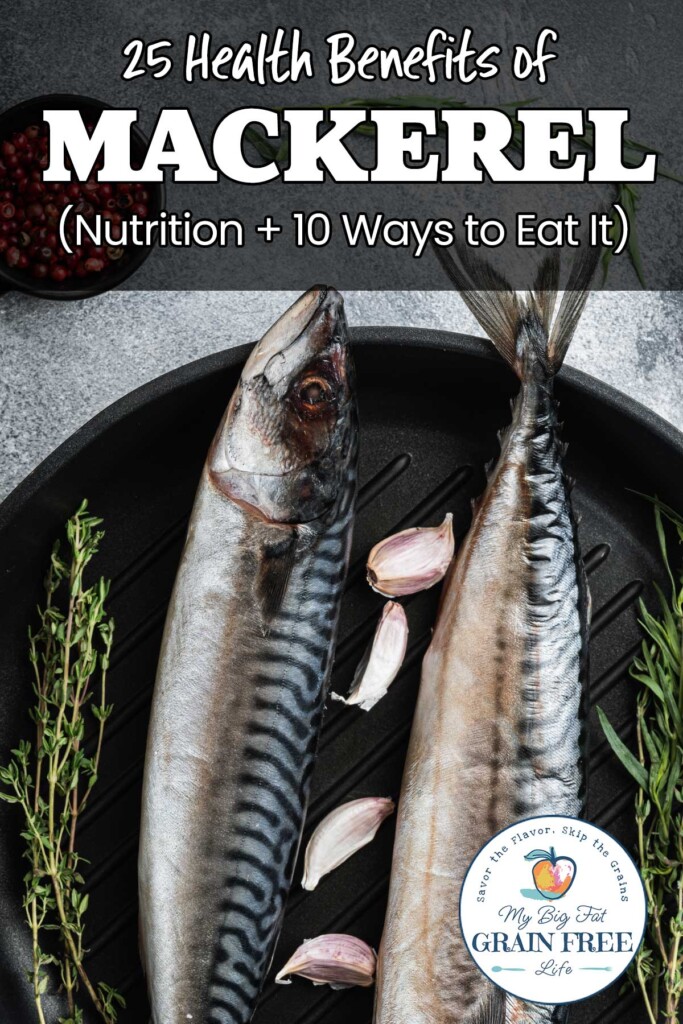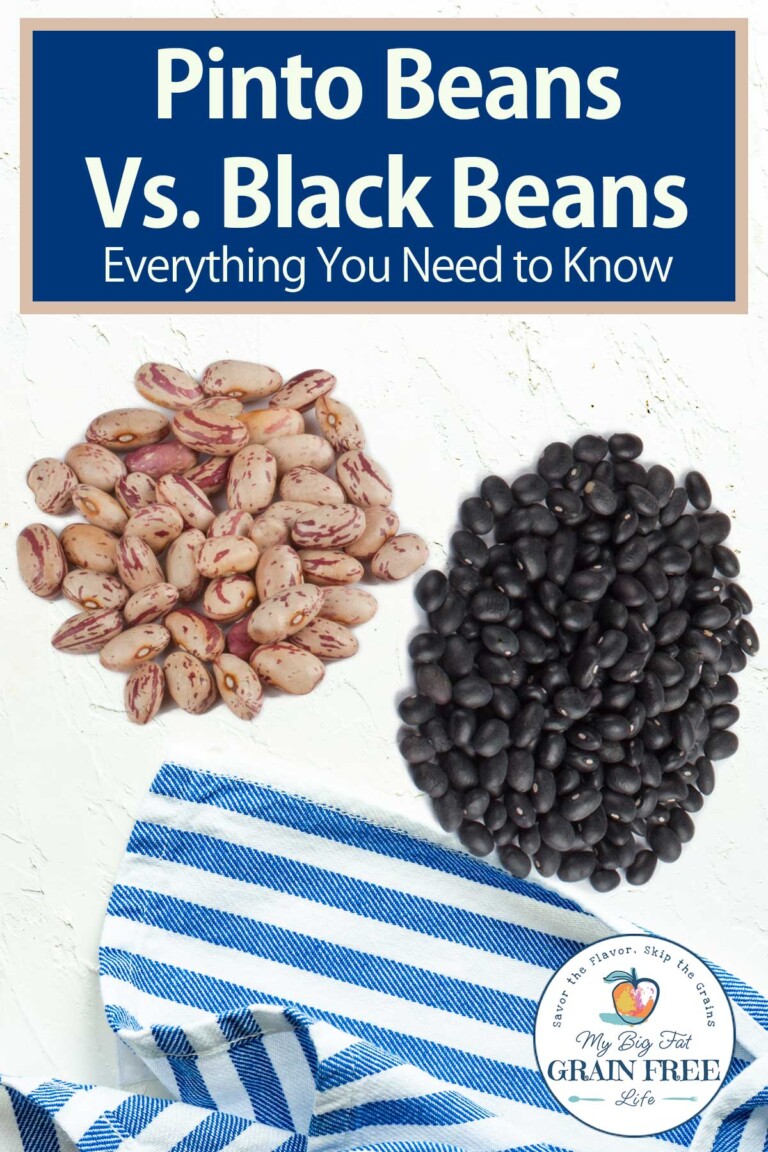25 Health Benefits of Mackerel (Nutrition + 10 Ways to Eat It)
This post may contain affiliate links. If you make purchase after clicking a link, I may receive a commission at no extra cost to you.
Last Updated on December 6, 2023
Discover the incredible health benefits of mackerel, from its nutritional value to delicious ways to incorporate it into your diet.

Health Benefits of Mackerel
Mackerel is a kind of fish that is widely known for its delicious taste and distinctively rich flavor. But did you know that mackerel also offers a plethora of health benefits?
From its incredible nutritional profile full of essential fatty acids to its potential longevity-boosting properties, there are plenty of reasons to add this fish to a balanced diet.
Let’s explore the various health benefits of mackerel fish, discuss its nutritional value, and look at some exciting ways to incorporate it into your meals.
What Is Mackerel?
Mackerel is an oily fish that is commonly found in both temperate and tropical waters. It belongs to the same family as tuna and is renowned for its unique flavor and tender, flaky texture.
There are several species of mackerel, including Atlantic mackerel, Spanish mackerel, Pacific mackerel, and king mackerel, each offering its own distinct characteristics and taste. (Learn more about these types of mackerel below.)

Types of Mackerel
Before diving into the health benefits, let’s take a closer look at the different types of mackerel.
- Atlantic Mackerel: Atlantic mackerel is a low-mercury fish, making it a good choice for consumption. It contains moderate levels of omega-3 fatty acids, which provide numerous health benefits.
- Spanish Mackerel: Spanish mackerel has a moderate to high mercury content. While it still contains beneficial nutrients like omega-3 fatty acids, it is advisable to consume this type of mackerel in moderation.
- King Mackerel: King mackerel fish is known to have high levels of mercury, which can be harmful if consumed in large quantities. It is recommended to limit the intake of king mackerel or avoid it altogether, especially for pregnant women and young children.
- Pacific Mackerel: Pacific mackerel is another low-mercury option that can be enjoyed as part of a healthy diet. It provides a good source of protein, omega-3 fatty acids, and other essential nutrients.
Mackerel Nutrition
When it comes to nutrition, mackerel is a true powerhouse. Packed with essential vitamins, minerals, and healthy fats, it offers a wide range of health benefits to those who include it in their diet regularly. Let’s delve into the nutritional profile of mackerel to give you a better understanding of its goodness.
High Levels Of Omega-3
Mackerel is an excellent source of two important omega-3 fatty acids: eicosapentaenoic acid (EPA) and docosahexaenoic acid (DHA). These fatty acids play crucial roles in promoting overall health and well-being.
Eicosapentaenoic acid (EPA)
Eicosapentaenoic acid is known for its anti-inflammatory properties. It helps reduce inflammation in the body, which can be beneficial for conditions such as arthritis, cardiovascular disease, and certain autoimmune disorders.
EPA also plays a role in supporting brain health and cognitive function.
Docosahexaenoic acid (DHA)
Docosahexaenoic acid is essential for the development and maintenance of the brain, eyes, and nervous system. It is particularly important during pregnancy and early childhood for proper brain development.
DHA has been associated with improved cognitive function, mental health, and reduced risk of age-related cognitive decline.
Vitamins and Minerals
Mackerel is a excellent source of selenium, phosphorus, potassium and vitamin B.
Vitamin B12 is essential for maintaining proper brain function and promoting the production of red blood cells. Selenium acts as a powerful antioxidant and supports a healthy immune system, while phosphorus and potassium play vital roles in maintaining bone health and regulating blood pressure, respectively.
Antioxidants
Mackerel contains a significant amount of antioxidants, which help protect the body against harmful free radicals. One particular antioxidant present in mackerel is coenzyme Q10 (CoQ10), which plays a crucial role in cell growth and maintenance. CoQ10 also contributes to the body’s energy production and helps combat the effects of oxidative stress.
Carbs
For those following a low-carb or ketogenic diet, mackerel is an excellent choice as it contains virtually no carbohydrates. This makes it an ideal food for those looking to manage their blood sugar levels or achieve weight loss goals while still enjoying a flavorful and satisfying meal.
Heart-healthy Fats
Mackerel is rich in heart-healthy omega-3 fatty acids and is a rich source of both polyunsaturated fats and monounsaturated fats. These essential fats are known to reduce inflammation, improve cardiovascular health, and support brain function.
In fact, mackerel is one of the best sources of omega-3 fatty acids among all types of fish.
Polyunsaturated Fats
Polyunsaturated fats, specifically omega-3 fatty acids, are known for their numerous health benefits. They help reduce inflammation in the body, support brain function, and promote heart health by reducing the risk of cardiovascular diseases.
Monounsaturated Fats
Monounsaturated fats, on the other hand, are also beneficial for our health. They can help lower cholesterol levels in the blood, which in turn reduces the risk of heart disease.
Additionally, monounsaturated fats provide essential nutrients that support cell growth and development.
Protein
Mackerel is an excellent source of protein, providing all essential amino acids needed for building and repairing tissues in the body.
Protein is essential for muscle growth, immune function, and maintaining a healthy metabolism. Including mackerel in your diet can help ensure you meet your daily protein requirements.

25 Health Benefits of Mackerel
In terms of health benefits, Atlantic and Pacific mackerels are considered the best choices due to their lower mercury content and high nutritional value. These types of mackerels offer a good balance between omega-3 fatty acids and potential exposure to mercury.
Now that we’ve covered the nutritional aspects, let’s explore the numerous health benefits associated with consuming mackerel.
Promotes a Healthy Heart
According to the American Heart Association, mackerel’s omega-3 fatty acids help reduce the risk of heart disease and lower triglyceride levels.
May Reduce the Risk of Alzheimer’s Disease
Omega-3 fatty acids are believed to have anti-inflammatory properties and can help protect brain cells from damage. Additionally, the rich vitamin B12 content of mackerel can help support healthy brain function and potentially reduce the risk of developing Alzheimer’s disease.
May Aid in Brain Function
The omega-3 fatty acids in mackerel support cognitive function and the nervous system and may help prevent age-related cognitive decline.
Promotes Eye Health
Mackerel’s high content of omega-3 fatty acids and antioxidants can help protect against macular degeneration and dry eye syndrome.
Supports Joint Health
The anti-inflammatory properties of omega-3 fatty acids may reduce joint pain and stiffness associated with conditions like rheumatoid arthritis.
Promotes Strong Bones
Mackerel’s phosphorus and vitamin D content contribute to bone health and help prevent osteoporosis.
Boosts Immune Function
The vitamin B12 and selenium in mackerel help strengthen the immune system and promote overall health.
Promotes Healthy Skin
The omega-3 fatty acids in mackerel can nourish the skin, reduce inflammation, and improve conditions such as acne and eczema.
May Help Reduce Risk of Depression
Studies suggest that omega-3 fatty acids may help alleviate symptoms of depression and boost mood.
Promotes Weight Management
Mackerel’s high protein content can help increase satiety and support healthy weight management.
Can Enhance Energy Levels
The combination of omega-3 fatty acids and protein in mackerel provides sustainable energy throughout the day.
May Help Regulate Blood Pressure
The potassium and omega-3 fatty acids in mackerel may help lower blood pressure levels and promote cardiovascular health.
Anti-Inflammatory Properties
The omega-3 fatty acids in mackerel have anti-inflammatory properties that can help mitigate chronic inflammation in the body.
Supports Liver Health
Mackerel’s antioxidant content can support liver function and protect against liver damage.
Helps Reduce Risk of Type 2 Diabetes
The low carbohydrate content of mackerel makes it a suitable choice for individuals with or at risk of developing type 2 diabetes.
Enhances Digestive Health
Mackerel’s protein and omega-3 fatty acids can support a healthy digestive system and reduce the risk of gastrointestinal disorders.
May Help Improve Respiratory Function
The anti-inflammatory properties of mackerel’s omega-3 fatty acids may help alleviate symptoms of asthma and improve respiratory health.
Promotes Healthy Pregnancy
Mackerel is a great source of nutrients for expecting mothers, providing essential omega-3 fatty acids, vitamins, and minerals necessary for fetal development.
Promotes Healthy Hair and Nails
The omega-3 fatty acids and protein in mackerel contribute to strong, healthy hair and nails.
May Reduce the Risk of Cancer
Some studies suggest that mackerel’s omega-3 fatty acids may have a protective effect against certain types of cancer.
Can Help Improve Sleep Quality
The omega-3 fatty acids in mackerel may help regulate sleep patterns and improve sleep quality.
Can Alleviate Menstrual Symptoms
Mackerel’s anti-inflammatory properties may help reduce the severity of menstrual pain and discomfort.
May Help Regulate Blood Sugar Levels
The low carbohydrate content and high protein content of mackerel can aid in stabilizing blood sugar levels, making it suitable for individuals with diabetes.
May Enhance Athletic Performance
Mackerel’s protein content provides essential amino acids, contributing to muscle repair and recovery, making it a valuable food for athletes.
Promotes Longevity
Preliminary research suggests that consuming fish rich in omega-3 fatty acids, like mackerel, may help promote a longer, healthier lifespan.
Mercury Content in Mackerel
Despite its numerous health benefits, it’s important to be aware of the mercury content in certain types of fish, including mackerel.
Mercury is a naturally occurring element that can accumulate in the bodies of fish, particularly larger species. Atlantic and Pacific mackerel are considered low in mercury and safe to consume in moderation.
It is recommended to limit the consumption of Spanish mackerel and king mackerel, due to their higher mercury content.
It is crucial to note, as stated by the U.S. Environmental Protection Agency (EPA), that young children, pregnant women, and nursing mothers should prioritize avoiding the consumption of king mackerel.
Good Mackerel Vs Bad Mackerel
When purchasing mackerel, it’s crucial to choose the right type. Opt for fresh or frozen mackerel from reputable sources to ensure its quality and safety. Avoid mackerel that appears discolored, has a strong fishy smell, or shows signs of spoilage. If you’re uncertain about the quality, consult your local fishmonger for guidance.
As mentioned above, Atlantic and Pacific mackerel are the best choices. At a moderate-high mercury content, you should consume Spanish mackerel on a very limited basis. King mackerel has a high mercury content, so it’s best to avoid that type of mackerel.
You might also like: Why You should Avoid Eating Swai Fish.
Storage and Safety
To ensure the quality and freshness of mackerel, proper storage is essential. Fresh mackerel can be refrigerated for up to two days, while frozen mackerel can be stored for several months.
When handling raw mackerel, it’s important to follow proper food safety practices, such as washing your hands thoroughly after handling and avoiding cross-contamination with other foods.

10 Ways to Cook Mackerel
Now that you’re familiar with mackerel’s health benefits and storage guidelines, let’s explore some creative ways to cook and enjoy this delicious fish:
- Pan-fried Mackerel: Coat your mackerel fillets with a flavorful spice rub and pan-fry them until golden and crispy.
- Grilled Mackerel: Brush your mackerel fillets with marinade or a vinaigrette, and grill them until they’re charred on the outside and tender on the inside.
- Baked Mackerel: Season your mackerel fillets with herbs, spices, and a squeeze of lemon juice, then bake them in the oven for a quick and healthy meal.
- Smoked Mackerel Pâté: Flake smoked mackerel fillets and mix them with cream cheese, lemon juice, and herbs to create a creamy and flavorful spread that can be enjoyed on toast or crackers.
- Mackerel Sushi: Slice fresh mackerel and use it as a topping for sushi rolls or sashimi to add a rich and savory flavor to your Japanese-inspired dishes.
- Mackerel Salad: Combine chopped mackerel fillets with a variety of fresh vegetables, herbs, and a tangy dressing for a light and refreshing salad.
- Mackerel Tacos: Fill warm tortillas with grilled mackerel, avocado slices, salsa, and a squeeze of lime juice to create a mouthwatering and healthy taco experience.
- Mackerel Curry: Simmer mackerel fillets in a coconut curry sauce and serve it over riced cauliflower for a satisfying and flavorful meal.
- Mackerel Sandwich: Pile flaked mackerel onto toasted grain free bread, along with leafy greens, juicy tomatoes, and your favorite condiments, for a delightful and nutritious sandwich.
- Mackerel Skewers: Thread marinated mackerel chunks onto skewers and grill them until they’re tender and slightly charred for a delightful and easy-to-eat meal.

Is Canned Mackerel Healthy?
Canned mackerel can be a healthy food option, as it is packed with essential nutrients. When buying canned mackerel, look for options that are packed in water or olive oil rather than heavy sauces or brine. This will help reduce the intake of added sugars and sodium.
Opting for canned mackerel that is sustainably sourced and labeled as wild-caught is also recommended. Wild-caught mackerel tends to have higher levels of omega-3 fatty acids, which are beneficial for heart health and brain function.
What Does Mackerel Taste Like?
Mackerel is known for its distinctively rich and oily flavor. Its taste is often described as robust, meaty, and slightly fishy. The natural oil content gives mackerel a buttery texture that melts in your mouth, making it a favorite among seafood enthusiasts.
If you enjoy fish with a stronger flavor profile, mackerel is sure to satisfy your taste buds.
How Much Mackerel Shoud I Eat?
Consuming mackerel or other fatty fish is highly beneficial for a healthy lifestyle. It is recommended to include at least two servings of fatty fish in your diet every week. Each serving should be around 3.5 ounces (100 grams) in order to reap the full health benefits associated with these types of fish.
Final Summary
Mackerel is not only a delicious fish but also very nutritious. Packed with essential vitamins, minerals, and heart-healthy omega-3 fatty acids, it offers a wide array of health benefits, including improved heart health, brain function, and joint health.
With its delicateflavor and versatile nature, mackerel can be enjoyed in various dishes, such as pan-fried fillets, grilled delicacies, and vibrant salads, making it a fantastic choice for those looking to enhance their culinary repertoire while reaping the numerous health rewards.
Sources
- https://health.clevelandclinic.org/3-fish-you-should-love-and-3-fish-you-should-snub
- https://www.fda.gov/food/environmental-contaminants-food/fdaepa-2004-advice-what-you-need-know-about-mercury-fish-and-shellfish
- https://www.heart.org/en/healthy-living/healthy-eating/eat-smart/fats/fish-and-omega-3-fatty-acids
- https://www.healthline.com/nutrition/how-much-omega-3
- https://my.clevelandclinic.org/health/articles/17290-omega-3-fatty-acids
- https://www.healthline.com/nutrition/omega-3-6-9-overview
- https://www.nutritionix.com/food/mackerel
- https://fdc.nal.usda.gov/fdc-app.html#/food-details/175119/nutrients







